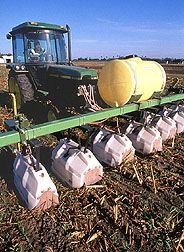Latino farmworker children ages 1 to 6 in North Carolina were found to have, on average, four pesticide metabolites in their urine, according to a just-published study in Environmental Health Perspectives.
Almost 90 percent of the 60 children had three or more pesticide metabolites in their urine, one-third had five or more, and only one child had none.
Metabolites of the highly toxic organophosphate (OP) parathion were found in 90 percent of the children, and chlorpyrifos was found in 83.3 percent. About 2.5 OPs were found, on average, in each child's urine, indicative of active exposures to each of these pesticides within the last few days, and evidence of the need for cumulative risk assessments of the OPs taking into account all active ingredients in the class and all routes of exposure.
The ubiquitous exposure of farmworker children in North Carolina to highly toxic OPs documented in this study occurred in the summer of 2004, two or more years after the regulatory actions taken by the Environmental Protection Agency against parathion and chlorpyrifos under the Food Quality Protection Act. Clearly, use of these OPs remains widespread and continues to expose children to heightened risk of developmental abnormalities, especially those impacting the brain and central nervous system.


